- Home
- John Scalzi
Fuzzy Nation Page 9
Fuzzy Nation Read online
Page 9
“She really is like a cat,” Holloway said. The conversation he was having with Isabel had gone bad quickly. Holloway was ready to dump it and start a new one.
“She’s really not,” Isabel said. “That’s what I had wanted to talk to you about, before you started hammering on me about Carl and we got sidelined.”
“Sorry about that,” Holloway said. “That’s a small, immediate apology. I had a meeting with Wheaton Aubrey the Seventh, and it was brought up.”
“I take it the meeting didn’t go well, then,” Isabel said.
“No,” Holloway said. “He condescended to me, I was antagonistic to him, he made a dismissive offer couched in contempt, I threw it back in his face and promised legal action if he tried to cross me again.”
“So, the usual with you,” Isabel said.
“I suppose,” Holloway said.
“The more I know you, the more I realize why you live hundreds of kilometers from anyone else,” Isabel said.
“Let’s get back to the thing you wanted to talk about,” Holloway said. He started walking toward the cabin; he wanted a beer.
“All right,” Isabel said. “These fuzzys. These animals you’ve discovered. I’m starting to wonder if they are animals.”
“I think you’ll be laughed out of the biologist club if you suggest they’re plants,” Holloway said.
“That’s not what I’m saying, obviously,” Isabel said. “When I say I don’t think they’re animals, I mean I don’t think they’re just animals. I think they’re something more.”
Holloway stopped walking and turned to face Isabel. “Tell me you’re not about to say what I think you’re about to say,” he said. “Because I know I don’t want to hear it.”
“I think they’re sapient,” Isabel said. “I think these creatures are intelligent on a level beyond just animals. These things are people, Jack.”
Holloway turned, irritated, and threw up his hands. He resumed his walk to the cabin. “You could have told me that before I turned down half a billion credits, Isabel,” he said.
Isabel followed, confused. “What does that have to do with anything?” she said.
“Zara Twenty-three is a Class Three planet,” Holloway said. He paused at the cabin door and pointed to Baby Fuzzy, who now appeared to be dozing lightly. “If that is a person, then this becomes a Class Three–a planet—a planet with native sapient life—and ZaraCorp’s E and E charter is suspended. That means everything stops here, Isabel. No more mining, no more drilling, no more harvesting. It means I don’t get paid for the sunstone seam.”
“Well, I’m sorry you might possibly be out a bit of money, Jack,” Isabel said.
“Jesus, Isabel,” Holloway said. He opened the door. “A bit of money? Try at least a couple billion credits. That’s billion, with a b. Saying that’s a bit of money is like saying a forest fire is a nice way to roast some marshmallows.” He went into the cabin. Isabel followed.
Inside the cabin, the other fuzzys lounged about; it had gotten hot and humid outside and Holloway’s cabin had climate controls. As Holloway glanced over, he saw Mama Fuzzy had taken a book down from the bookcase and she and Papa were examining it carefully. Closer examination showed Mama Fuzzy was holding it upside down.
“Maybe they’re not as smart as you think,” Holloway said, pointing out the upside down book to Isabel. He reached into his kitchen cooler to retrieve a beer.
Isabel looked at him, and then set Baby Fuzzy down. She padded off toward the rest of her family; Isabel headed to the kitchen. “Papa,” she said. The fuzzy looked up from his book, curious, then headed toward the kitchen.
“Excuse me,” Isabel said to Jack. She pushed him aside to get at the cooler. From the cooler she retrieved smoked turkey, cheese, mayonnaise, and mustard. She set them on the small kitchen table. She closed the cooler, and then reached over to the counter to take the last two bread slices and placed them on the table. Finally, she opened the utensil drawer and put a butter knife next to all the food. She looked down at the fuzzy.
“Papa,” Isabel said. “Sandwich.”
The fuzzy squeaked in joy.
Four minutes later all the fuzzys were enjoying their share of the sandwich Papa Fuzzy had made, up to and including clumsily wielding the butter knife to make six mostly equal sections, the last of which had been presented to Carl with great gravity.
“You could have taught him to do that,” Holloway said. “I once taught a dog to detonate explosives.”
“Not to take anything away from Carl, whom I love,” Isabel said, “but it’s one thing to teach an animal to step on a detonator panel to get a treat. It’s another thing to teach it how to make a sandwich. Much less then divide it equally among five other animals.”
“A monkey could do it,” Holloway said.
“Name one,” Isabel said.
“I’m not the biologist,” Holloway said.
“Really,” Isabel said, mildly. “There’s also the small matter that even if I could have trained Papa to make a sandwich, I didn’t. I came in here not long after you left for your meeting and found Papa making one. Either he saw you making one or he’s even more clever than I thought. Which would go to my point.”
“He saw me make one,” Holloway said. He started putting away the sandwich fixings.
“So what we’re saying is that this animal, having observed you make a sandwich once, managed to remember where the ingredients were, retrieved them, organized them, and re-created a sandwich recipe from memory, not once, not twice, but three times,” Isabel said.
“Three times?” Holloway said.
“After I caught him doing it, I made him do it again, just to be sure,” Isabel said.
“You’re going to make them fat,” Holloway said, closing the cooler.
“He gave the second one to me,” Isabel said.
“How sweet,” Holloway said, dryly. He took another swig of his beer.
“Which in itself shows higher-order cognitive function,” Isabel said. “It’s called theory of mind. Papa assumed that when I asked him to make another sandwich, that I was asking him to make it for me, because I was hungry. He was attributing intent and reason to me.”
“I know what theory of mind is,” Holloway said. “You know who else has theory of mind? Monkeys. And some species of squid. Even Carl here tries to figure out what I’m thinking.” From the floor, Carl, hearing his name, thumped his tail on the floor a couple of times.
“Squids don’t make sandwiches,” Isabel said.
“I doubt there’s been a scientific study on that matter,” Holloway said. “The bread gets soggy.”
“Stop that,” Isabel said. “Neither do monkeys, and neither does Carl. And certainly none of them could do it from seeing you do it once. These aren’t just animals, Jack.” She bent down again to get a beer for herself.
“But it doesn’t mean they’re sapient,” Holloway said. “I know these things are smart, Isabel. That’s why I recorded Papa in the first place and gave you the recording. These little guys are a big find. I knew you’d want to see them. But it’s a hell of a leap from ‘smart little monkey’ to ‘sapient people.’ Have you ever heard them speak?”
“They definitely communicate,” Isabel began. Holloway held up his hand.
“Not in contention,” Holloway said. “They squeak and squeal with the best of them, and they definitely have animal-level communication down pat. Given. But is there evidence they have speech? Language? Some manner of communication that goes beyond what we would see in other very smart animals?”
Isabel was quiet for a moment. “No,” she said, finally. She took a drink of her beer.
“You know that matters,” Holloway said. “I was required to take a class in xenosapient law at Duke. I don’t remember that much of it, because it wasn’t going to be my specialty anyway. But I remember Cheng versus BlueSky Incorporated. It’s the one where a company biologist maintained the Nimbus Floaters of BlueSky Six were sapient and went to cour
t in their behalf to stop the exploitation of the planet. The court ended up having to develop a checklist of criteria to judge the sapience of a creature, and speech—or ‘meaningful communication that conveys more than the immediate and presently imminent’—was part of that checklist. It’s canon law.”
“It’s not the only thing on the list,” Isabel said.
“No, but it’s a big one,” Holloway said. “It’s what tripped up Cheng. He couldn’t prove the floaters spoke.”
“You’re not exactly an impartial party on this,” Isabel said.
“No, I’m not,” Holloway said. He motioned out toward the Fuzzys, who had finished their meals and retired to the floor once more, to look at the book or to nap on Carl. “If our little friends here are just really smart animals, then I get to be a billionaire. If they’re people, then I’m just another schmuck out of a job, and I have a very good reason to believe that I’d have trouble getting another prospector gig. So yes, I’d say I’m a pretty interested party.”
“Glad you know it,” Isabel said.
“I do,” Holloway said. “But even if I weren’t, I’d still be telling you to be absolutely sure that what you’ve got is what you think it is. Because the minute you file a Suspected Sapience Report, ZaraCorp is required by law to suspend all activity on this planet. Everything comes to a screeching halt while a court decides on our fuzzy friends’ sapience. It won’t just be me you’ll cost billions. And if the ruling goes against the fuzzys, you’re going to spend the rest of your life as a grocery clerk. So before you say anything about sapience to anyone, you need to be absolutely sure. Are you absolutely sure, Isabel?”
Another moment of silence from Isabel. Then, “No. No, I’m not absolutely sure. I’m not saying I am. I need to study them more.”
“All right, then,” Holloway said. “So study them some more. Take your video and make your observations and do whatever it is you need to do. There’s no need for you to rush any of this. Take your time. Take lots of time.”
Isabel snorted. “Enough time for you to become a billionaire, you mean,” she said.
“That would be nice,” Holloway said. “I could very happily live with that.”
“I know you could,” Isabel said, and then motioned to the Fuzzys. “But could they?”
“I don’t follow you,” Holloway said.
“This is their planet, Jack,” Isabel said. “If they are sapient, everything we take out of this world is a little less for them to use for themselves. Maybe you’re not aware of how efficient ZaraCorp is at stripping a planet of its easily accessible resources—or maybe you don’t want to be aware—but I know. I read the biological impact reports on all the planets ZaraCorp exploits. Some of the first planets ZaraCorp received its E and E charters for are already at depletion levels approaching Earth’s, when it comes to rare metals and minerals. Even common ores are being pulled out of the ground at hugely accelerated rates. That’s just a few decades of work. And ZaraCorp is much better now at doing this than it was even a decade ago.”
Holloway thought of how quickly the camp was springing up at the sunstone seam. He took another swig of his beer and finished it.
“So if they are sapient, even if we waited just a year or two, think of how much less they would have to work with,” Isabel said. “Taken before they can use it for themselves.”
“They’re at the level where they’ve just discovered sandwiches,” Holloway said. “Working a sunstone seam is not high on their agenda.”
“You’re missing the point,” Isabel said. She set down her beer. “The point is when they are ready, it won’t be there. That sunstone seam you found is the result of millions of years of heat and pressure. ZaraCorp is going to pull it all out of the ground in a decade, if it takes even that long. And that’s it for the sunstones; the creatures whose bodies made them are extinct. And then there are the other ores and minerals. It’ll take millions of years for the planet to replenish these minerals. Some might not ever replenish at all. What does it leave for them?”
“I get what you’re saying,” Holloway said. “And you’re probably right. I still think you should be sure before you try to claim sapience. Not saying you shouldn’t make the claim. Just saying you should be sure. This is me trying to talk to you as a friend, here.”
“Thanks,” Isabel said. “I know. I’m just thinking, is all. Do you ever stop to think how lucky we are that, in this part of space at least, humans were the sentient creatures who got smart first?”
“It’s crossed my mind,” Holloway said.
Isabel nodded. “Now,” she said, “imagine what would have happened if half a million years ago, some alien creature landed on our planet, looked at our ancestors, decided that they weren’t actually people, and just took all the planet’s ores and oil. How far would we have ever gotten?”
Isabel motioned to the Fuzzys, who were now all asleep on the cabin floor. “Seriously now, Jack,” she said. “How far do you think they’re going to get once we’re through here?”
Chapter Eleven
Holloway had two thoughts when the front rotors of his skimmer failed. The first thought was What the hell? This was because while having a single rotor crap out was not all that unusual, having two die simultaneously was.
The second thought was Oh, shit. This was because Holloway was by himself in the middle of nowhere, and he was about to crash-land on the jungle floor, where something large would almost certainly try to eat him.
Holloway smacked the manual override on the autopilot and jerked up the yoke on the skimmer. He’d worry about getting eaten later. Right now he needed to avoid the crash landing. If he could get the skimmer on the ground without cracking it up, he might be able to get it fixed and get out of there. If he crashed and broke the skimmer, his odds of ending the day partially digested rose astronomically.
Holloway reached along the dash of the skimmer for the pullcords for the emergency rotor engines. All the rotors were driven by the same power plant mid-skimmer, underneath the passenger cabin, and controlled by computer rather than by direct manipulation. But drive shafts wore down and computer hardware and programs degrade over time, two facts that presented real problems when one’s conveyance traveled up to a thousand meters above the ground. In the event of emergency, small motors built directly into the rotors themselves could be engaged. The motors were too small for movement, and their power lasted only a matter of minutes. Their only purpose was to stabilize the craft and allow for an immediate landing.
Holloway grabbed the pullcords for the front rotors and yanked viciously. The pullcords tensed and snapped as the tautened cords yanked the activation pins out of the EREs. If Holloway survived, he’d have to have the EREs recharged and the cables and pins reset. It was one of those things that by manufacturer design was impossible to do by oneself and required a trained and licensed professional. Who would insist on recharging and resetting all the EREs, not just the ones that got used. Holloway would have to spend a thousand credits to have it done, cursing as he did so.
None of which concerned Holloway in the least at the moment. At the moment, he was praying the EREs had held their charge since the last time he had gotten them replaced, more than a year earlier.
They had. The front rotors clicked into default position and sputtered to life. A timer flashed onto Holloway’s info panel; he had two minutes and thirteen seconds to land. Holloway minimized the timer and clicked on his undercarriage cameras, looking for a place to park.
The area, which Holloway had been surveying over the last three days per orders, was heavily forested. He’d been having a difficult enough time getting the skimmer through the forest canopy that he’d been relying on small remote-controlled robots to set the acoustical charges and the data collectors. They had gotten the job done, but took far more time than getting the skimmer down and using the digger/driller built into the vehicle.
But now he didn’t have a choice. He was going to have to go in. Holloway nudged the
skimmer forward, using its rear rotors, to a patch of the canopy that looked less impenetrable than every other part of the local canopy. He double-checked his seat restraints and then hit the EMERGENCY LANDING button on the dash.
The seat restraints tightened to a breath-shortening degree, and Holloway heard the pop as the head restraint inflated and then formfit around his skull, obscuring his vision. Other restraints did the same for his legs and arms. The chair, which generally swiveled, locked in a forward position. Holloway was immobilized; he was now in the hands, so to speak, of the skimmer’s automated systems. Holloway was briefly grateful that he left Carl behind with Isabel and the Fuzzys. It promised to be a rough ride down.
It was. The skimmer lurched sickeningly as it began its rapid but hopefully computer-controlled descent, dropping faster than under gravity alone, using the skimmer’s mass and build strength to snap tree branches when they couldn’t be gotten out of the way of. The jolting of the cabin and the thunderous cracking sound told Holloway there was going to be a pile of lumber when he landed.
Seven meters from the ground, twelve short-burst rockets on the skimmer’s undercarriage blasted on, the thrust of each precisely calculated using the skimmer’s current position to arrest the descent, level the skimmer, and land it more or less gently on the jungle floor. As the thrusters kicked in, Holloway felt the painful tug of his internal organs falling the millimeter or so internally at descent speed before being slowed by the rest of his body. The nerve-rattling thump of the landing informed him that this landing was on the “less” side of gentle rather than “more.”
The seat restraints slackened and the inflatable restraints hissed as they released; the skimmer’s rotor drive shut off. Holloway pulled himself out of his seat and grabbed the infopanel for a status update. The skimmer had registered denting, and the left rear rotor’s maneuvering apparatus was knocked off beam during the landing. If Holloway ever got the skimmer running again, it would be able to provide lift but not forward motion. But overall the skimmer survived. Holloway had landed without crashing.

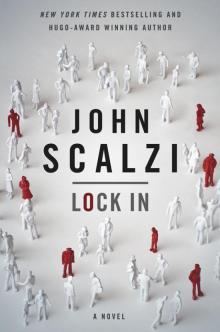 Lock In
Lock In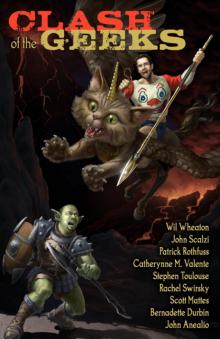 Clash of the Geeks
Clash of the Geeks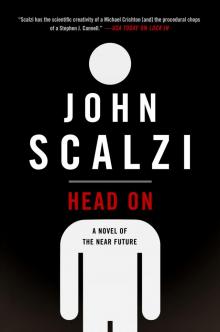 Head On
Head On The Dog King
The Dog King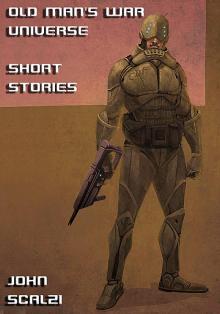 Old Man's War Universe: Short Stories
Old Man's War Universe: Short Stories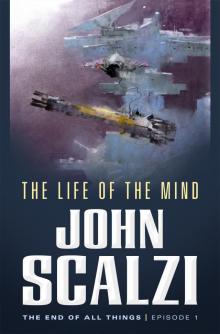 The End of All Things
The End of All Things Tales From the Clarke
Tales From the Clarke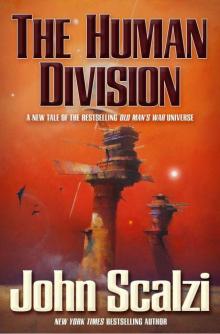 The Human Division
The Human Division The Android's Dream
The Android's Dream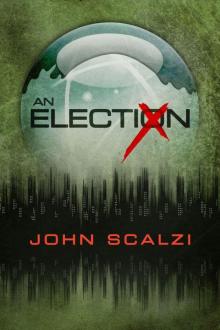 An Election
An Election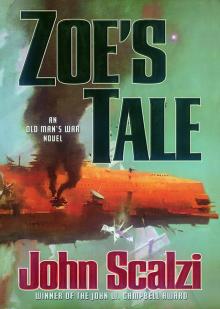 Zoe's Tale
Zoe's Tale Agent to the Stars
Agent to the Stars This Hollow Union
This Hollow Union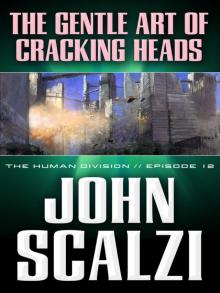 The Gentle Art of Cracking Heads
The Gentle Art of Cracking Heads Old Man's War
Old Man's War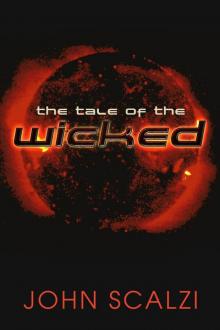 The Tale of the Wicked
The Tale of the Wicked Your Hate Mail Will Be Graded: A Decade of Whatever, 1998-2008
Your Hate Mail Will Be Graded: A Decade of Whatever, 1998-2008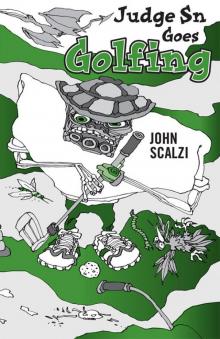 Judge Sn Goes Golfing
Judge Sn Goes Golfing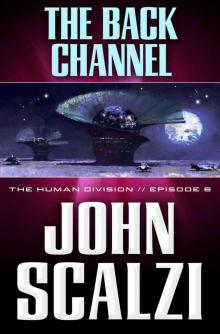 The Back Channel
The Back Channel The Human Division 0.5 - After the Coup
The Human Division 0.5 - After the Coup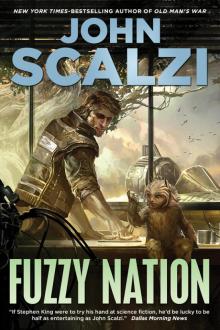 Fuzzy Nation
Fuzzy Nation The Observers
The Observers This Must Be the Place
This Must Be the Place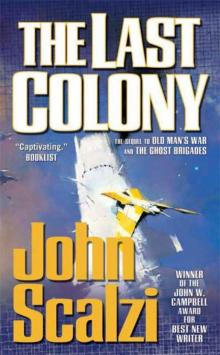 The Last Colony
The Last Colony Unlocked: An Oral History of Haden's Syndrome
Unlocked: An Oral History of Haden's Syndrome A Voice in the Wilderness
A Voice in the Wilderness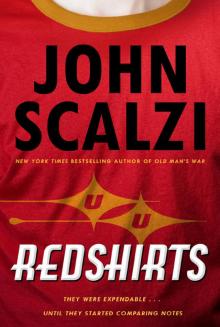 Redshirts
Redshirts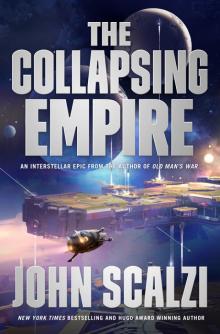 The Collapsing Empire
The Collapsing Empire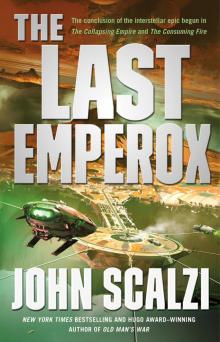 The Last Emperox
The Last Emperox The God Engines
The God Engines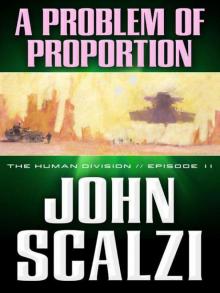 A Problem of Proportion
A Problem of Proportion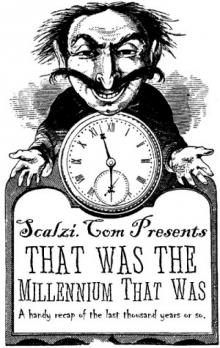 THAT WAS THE MILLENIUM THAT WAS
THAT WAS THE MILLENIUM THAT WAS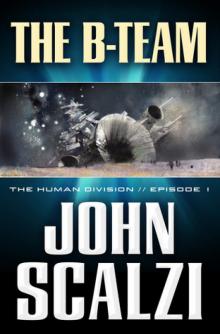 The B-Team
The B-Team The Sound of Rebellion
The Sound of Rebellion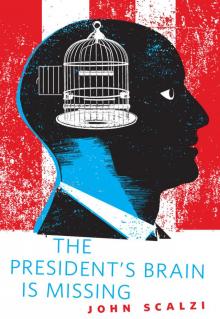 The President's Brain Is Missing
The President's Brain Is Missing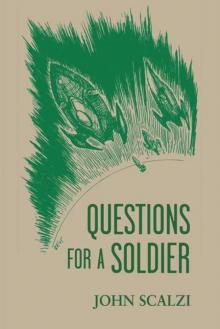 Questions for a Soldier
Questions for a Soldier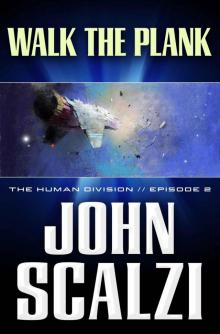 Walk the Plank
Walk the Plank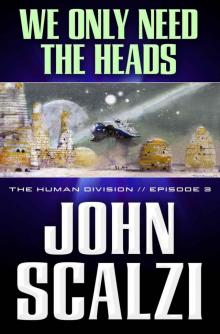 We Only Need the Heads
We Only Need the Heads How I Proposed to My Wife: An Alien Sex Story
How I Proposed to My Wife: An Alien Sex Story Earth Below, Sky Above
Earth Below, Sky Above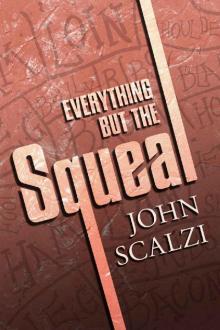 Everything but the Squeal
Everything but the Squeal Old Man’s War
Old Man’s War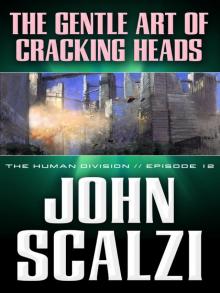 The Human Division #12: The Gentle Art of Cracking Heads
The Human Division #12: The Gentle Art of Cracking Heads This Must Be the Place thd-10
This Must Be the Place thd-10 A Voice in the Wilderness thd-4
A Voice in the Wilderness thd-4 The Observers thd-9
The Observers thd-9 The End of All Things: The Fourth Instalment
The End of All Things: The Fourth Instalment Earth Below, Sky Above thd-13
Earth Below, Sky Above thd-13 Zoe`s Tale вбиос-4
Zoe`s Tale вбиос-4 After the Coup
After the Coup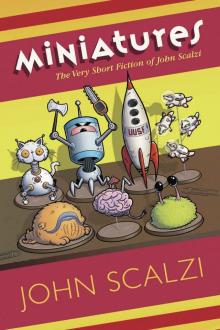 Miniatures: The Very Short Fiction of John Scalzi
Miniatures: The Very Short Fiction of John Scalzi The Last Colony вбиос-3
The Last Colony вбиос-3 Tales From the Clarke thd-5
Tales From the Clarke thd-5 Old Man's War omw-1
Old Man's War omw-1 The Human Division #8: The Sound of Rebellion
The Human Division #8: The Sound of Rebellion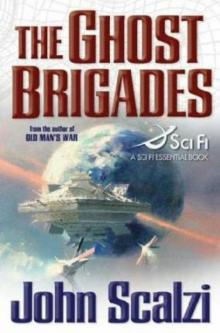 The Ghost Brigades omw-2
The Ghost Brigades omw-2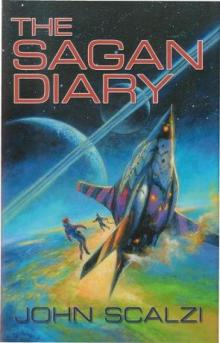 The Sagan Diary (old man's war)
The Sagan Diary (old man's war) The Sound of Rebellion thd-8
The Sound of Rebellion thd-8 The Human Division 13 - Earth Below, Sky Above
The Human Division 13 - Earth Below, Sky Above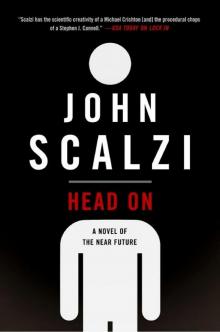 Head On_A Novel of the Near Future
Head On_A Novel of the Near Future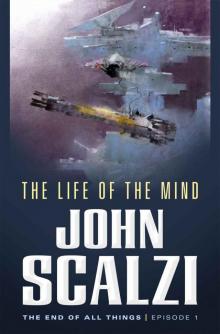 The End of All Things: The First Instalment
The End of All Things: The First Instalment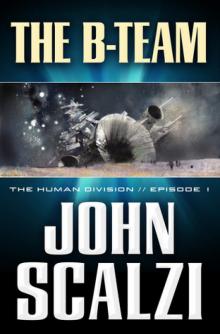 The B-Team thd-1
The B-Team thd-1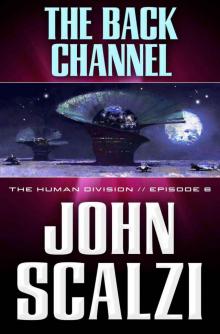 The Back Channel thd-6
The Back Channel thd-6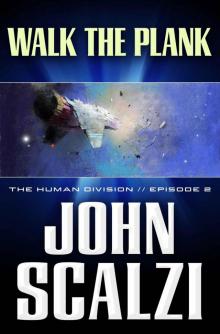 Walk the Plank thd-2
Walk the Plank thd-2 The Human Division #9: The Observers
The Human Division #9: The Observers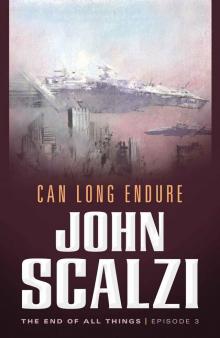 The End of All Things: The Third Instalment
The End of All Things: The Third Instalment The Human Division #10: This Must Be the Place
The Human Division #10: This Must Be the Place The End of All Things #2: This Hollow Union
The End of All Things #2: This Hollow Union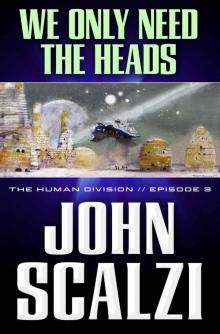 We Only Need the Heads thd-3
We Only Need the Heads thd-3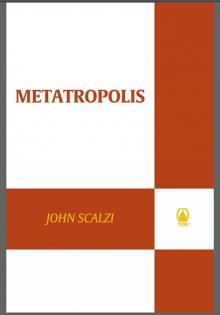 Metatropolis
Metatropolis The Dog King thd-7
The Dog King thd-7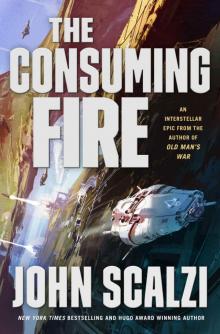 The Consuming Fire (The Interdependency)
The Consuming Fire (The Interdependency) The Human Division #11: A Problem of Proportion
The Human Division #11: A Problem of Proportion